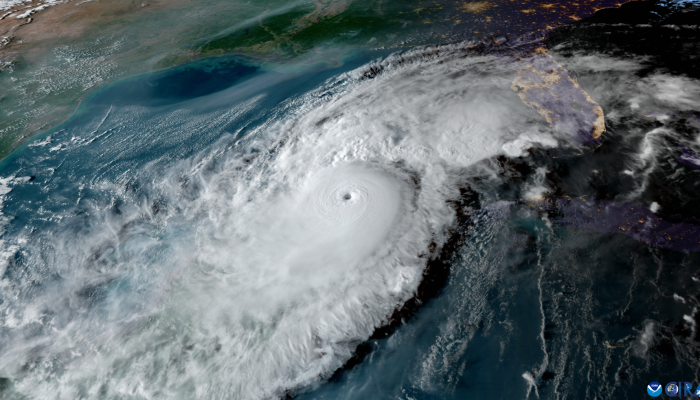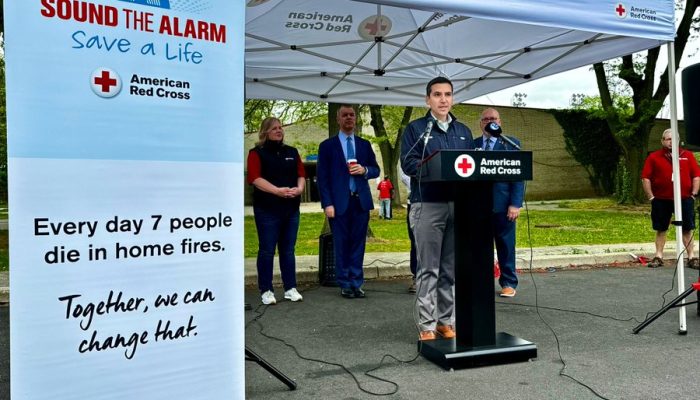The winter weather outlook for Philadelphia and Mid-Atlantic states is expected to be favorable for warmer-than-average temperatures, according to the National Oceanographic and Atmospheric Administration’s (NOAA) Winter Outlook. This is due to a slowly developing La Nina weather pattern.
As far as the prediction for precipitation, that is still ‘up in the air’. There are equal chances of above, below, and near normal precipitation which is 9.85 inches total precipitation for the season which runs December through February.
To prepare for the winter season and the hazards it brings, our infrastructure planning staff, who manage the city’s Winter Weather Plan, held a workshop with dozens of partners to share information on how city departments and partners are ready to respond.
Here are some of the workshop’s highlights to help you at home.
National Weather Service
NOAA’s National Weather Service has updated and improved winter forecasting tools aimed at simplifying forewarning information that is shared with the public to make it easier to understand and use.
Their Probabilistic Winter Storm Severity Index product enhances awareness of storms by visually representing the likelihood of potential impacts due to expected winter hazards over a seven-day period. This is complemented by an existing operational version of the Winter Storm Severity Index, which is based on the official National Weather Service forecast of the most likely conditions over the next three days.
NOAA is also simplifying its cold weather products to improve messaging of these hazards and provide better decision support services. Wind Chill Watch, Warning, and Advisory products were consolidated into the Extreme Cold Watch and Warning and Cold Weather Advisory products. The Hard Freeze Watch and Warning products were added into the existing Freeze Watch and Warning products.
Philadelphia Department of Streets
Winter weather can bring hazardous road conditions, including ice and snow. The Philadelphia Department of Streets is responsible for care of approximately 2,575 miles of city roads and highways, which are broken down into primary, secondary, and tertiary roadways.
If accumulating snow is in the forecast, the city’s Managing Director may declare a Snow Emergency. This means that vehicles may not park on certain roads in the city so that the Department of Streets can conduct plow operations. There are 110 miles of snow emergency routes in the city.
PECO
Snow, ice, and high wind gusts can contribute to power outages.
Philadelphia’s power utility company PECO has ways to help before, during, and after a storm, including, preventing outages, storm readiness, storm restoration process, reporting outages online, and tracking current outages. Click on the “Outages” drop down menu on their homepage. PECO’s free mobile app also allows you to easily report outages and stay up to date on the restoration status.
If a tree falls during a storm and poses an immediate safety threat, call 911. Otherwise, call the city’s non-emergency number 311. A crew of arborists from Philadelphia Parks & Recreation are on-call to respond to tree emergencies. In the event that a tree has fallen on electrical wires, please call PECO’s emergency line: 1-800-841-4141.
Philadelphia Water Department
Extreme cold can cause pipes and the ground to expand and contract, and very cold river water can also make water mains more brittle. In part, those factors can help to explain why more than half of Philadelphia’s water main breaks occur during the coldest months in a typical year.
Last winter, water department crews responded to over 330 water main breaks.
Information from the Philadelphia Water Department looks to prevent costly repairs and provide information on what you should do if you experience pipes breaking.
If you believe you have no water because of a water main break, call (215) 685-6300 and select the emergency option. Water Department emergency crews will investigate the report.
Office of Homeless Services
During excessive cold temperatures, the Philadelphia Office of Homeless Services can declare a Code Blue to help protect the health of vulnerable people who are living or sleeping outdoors. Call the OHS Street Outreach Team at 215-232-1984 if you see someone in need of help.
Department of Public Health
Prolonged exposure to the cold can result in serious health problems, most common being hypothermia and frostbite according to the Philadelphia Department of Health. Dress warm and stay dry.
- Dress in layers. Wear hats, scarves, and water-repellent coats. Wear mittens instead of gloves; they’ll keep your hands warmer.
- Cover your mouth. Protect your lungs from extremely cold air by covering your mouth.
- Be aware of wind chill. Wind carries heat away from the body.
- Be aware of frostbite. Frostbite is frozen body tissue, usually skin. It affects fingers, toes, ears, and the tip of the nose first. The skin might lose feeling or look white, pale, hard or waxy. Then the skin may turn red, blue or purple. Skin can also swell or blister. The victim may also feel tingling, burning or severe pain as the frostbitten tissue thaws. If symptoms are detected, get medical help immediately.
- Keep children warm, especially babies. Children and babies lose body heat faster than adults, so they can get frostbite faster.
Hypothermia (abnormally low body temperature) is a life-threatening condition. If you suspect hypothermia symptoms:
- Get to a warm location.
- Remove wet clothing.
- Put on dry clothes and wrap your entire body in a blanket.
- Warm the center of the body first.
- Drink warm non-alcoholic and non-caffeinated beverages.
- Seek medical attention as soon as possible.
Philadelphia Fire Department
Heat your home safely. Heating sources are the second-leading cause of home fires. It is imperative that you heat your home safely to prevent an emergency. Here are a few quick safety tips:
- Keep any object that could catch fire at least 3 feet away from a heat source.
- Plug only one heat-producing appliance (such as a space heater) into an electrical outlet at a time.
- Never plug a space heater into an extension cord.
- Never use an oven to heat your home.
The Philadelphia Fire Department (PFD) recommends having one smoke alarm on each floor of your home, including the basement. They should be 10-year smoke alarms, with sealed lithium-ion batteries. If you don’t have smoke alarms, you can request them for free through 311 or buy them at most hardware stores.
Philadelphia Police Department
Excessive rain in and around the city can cause dangerous flooding by swelling waterways and streets, making roadways impassible. The city saw this last winter as heavy precipitation caused the closure of flood-prone areas like Kelly Drive, Delaware Avenue, and Cobbs Creek Parkway.
Philadelphia Police will close impacted roadways until floodwaters recede and the Department of Streets can clean up the road before safely reopening.
A mere 6 inches of fast-moving flood water can knock over an adult. It takes just 12 inches of rushing water to carry away most cars and just 2 feet of rushing water can carry away SUVs and trucks. It is NEVER safe to drive or walk into flood waters. Never drive through floodwaters or around barricades.
Office of Emergency Management
If hazardous winter weather is predicted, the Office of Emergency Management may hold a severe weather coordination call with partners to discuss the forecast and its impacts to the city. Part of the discussion is public information, which is delivered to the news media, social media, and through the city’s mass notification system, ReadyPhiladelphia.
Our office will send weather alerts, like snowstorm, snow emergency, snow squall warnings, or extreme cold direct to your phone or email. ReadyPhiladelphia is now available to residents and businesses in 11 different languages, including American Sign Language (ASL). Customize your alerts by visiting our ReadyPhiladelphia webpage.




